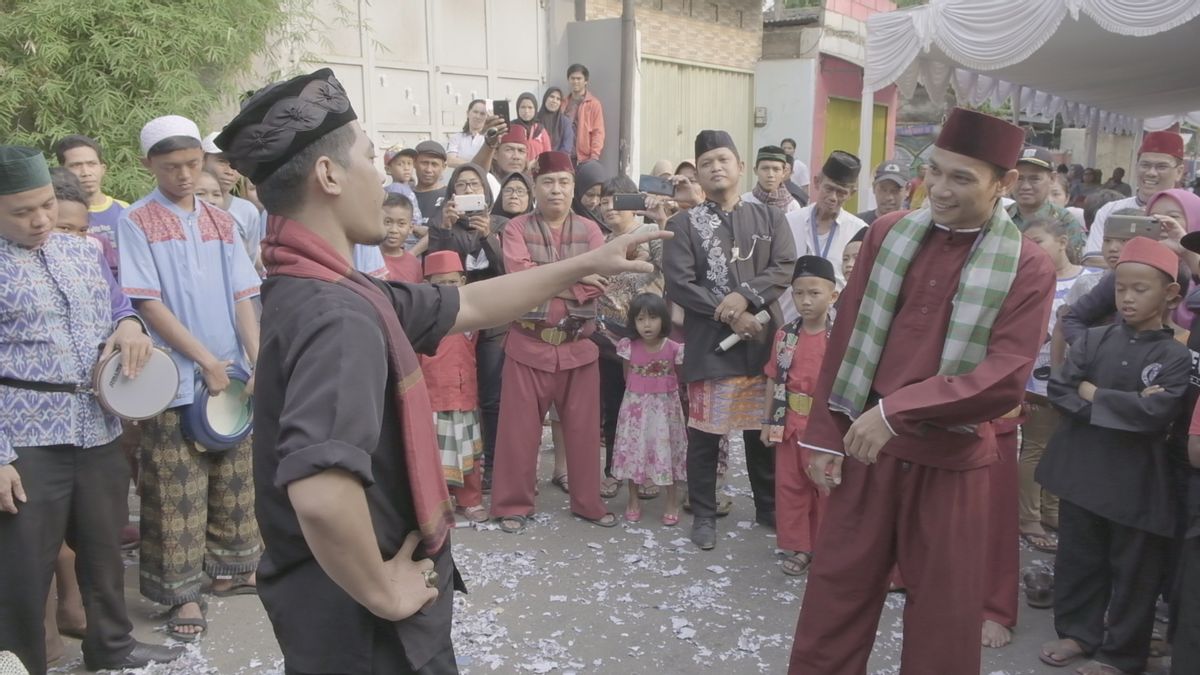JAKARTA - Discussing things related to Jakarta and the Betawi ethnicity is of course the same as discussing Indonesia. Because, as the researcher Lance Castles said in 1967, he considered Jakarta the true face of Indonesia, where people from various ethnic groups then merged into a new identity, namely Betawi.
"In Jakarta, God is making Indonesians!" so he said. Then, discussing the Betawi ethnicity becomes interesting. Not only related to the principles of their lives who are religious, good at martial arts, and have a culture. It is because the Betawi people always sacred three main things in life. First, birth. Second, marriage. Third, death.
On that basis, the entire life cycle of the Betawi people is closely related to cultural touches that have been rooted for a long time. One of the Betawi cultures that is full of meaning and is still practiced today can be seen through the wedding procession. At least, there are approximately a dozen processions for the Betawi people to truly unite with their idol. However, what is most interesting and also enjoyed by many audiences is of course present in the doorstop tradition.
The tradition of opening the latchAs stated by Alwi Shahab in the book Maria van Engels: Habib Kwitang's Men-in-law (2006), revealing the tradition of opening the doorstop is an important part of the Betawi ethnic marriage procession, which was preceded by the arrival of the groom's entourage to the bride's house to carry out the marriage contract.
Uniquely, the groom cannot immediately carry out the contract because he has to go through the procession to open the latch first. In the Betawi language, a cross is defined as a barrier so that other people or something can pass, and a door is a place to enter.
“This activity occurred when the procession of 'Tuan raja mude' (a call for grooming) in the afternoon was about to enter the house of the 'Tuan putri' (bride). When they were about to enter the house, the host's representative stopped the group. Facing this obstacle, the groom's entourage didn't want to be outdone, but they were still strong, ”said Alwi.
In order to enter the house to carry out the procession of the marriage contract, the two parties brought their respective pantun artists and martial arts masters alias champions in their villages. How could it not, as long as the tradition of opening the latch, both parties are required to reciprocate rhymes. In fact, not infrequently from responding to rhymes, residents who witnessed the doorstop were also immersed in the antics of the rhyme action.
Usually, as a condition to be able to open the latch, the groom must be at least good at the Koran and good at martial arts. The proof is not only seen from buying and selling attacks during a duel, but also through reciprocating rhymes.
"If you want to apply, you must fulfill the conditions. Like the word bang: Atep walnuts, finches in the kemboje puhun, when your brother is not steady here, it's better to go home. "
Not surprisingly, hearing this answer, the groom's pantunist then caught fire with anger and hurriedly replied: "buy areng to Sukabumi, aye kebonan guava tree, udeh has already come here, so that kate becomes ash aye lakonin."
After that, the first requirement, namely martial arts master, began to act. Equally with that, the champion of each bride shows skill so that a duel is inevitable. Of course the one who has to win is the champion of the groom. Usually after two to three steps, the bride says: "Enough, enough."
Even so, the groom has not been allowed to enter. Later, the bride will question the extent of the groom's religious knowledge by testing him reading verses from the holy book of the Koran.
On the basis of having learned the Koran since he was a child while being equipped with religious knowledge in everyday life, this requirement was easily overlooked. Therefore, the two extended families immediately shook hands and hugged each other in order to reduce tension during the tradition of opening the latches.

Interestingly, the doorstop is not only located in the variety of rhetoric and silat retaliation. moreover there are other things that make latches attractive. Quoted from Abdul Chaer in the book Betawi Tempo Doeloe (2015), he revealed that the latch was getting more festive because the group also brought items in line consisting of cakes, clothes, a pair of crocodile bread or crocodile bread carrying a child.
There are other things that must be present in the latch. "There are several people carrying coconut flowers, ketimpring tambourine drummers who will accompany the group's journey. Besides, in front of the group is a pair of ondel-ondel. "
Through this tradition, you can see how the Betawi people interpret life. For example, the presence of sike readers - prophet prayer readers - in a group that symbolizes being a Betawi must be good at the Koran. Its presence, the coconut flower which symbolizes life must be versatile, remembering from the roots to the coconut fruit all can be useful.
The rest, jago silat symbolizes the groom is also skilled in martial arts, not for his own sake, especially to defend those who are weak. Then, the presence of ondel-ondel is believed to be a repellent for reinforcements. In that sense, all kinds of harm will certainly not come to the owner of the marriage ceremony.
Not to mention, a line of firecrackers were burned as a sign of a big celebration, so that those around the village would come to the wedding ceremony. Finally, the presence of a pair of crocodile bread symbolizes loyalty in the household.
"According to the Betawi people, crocodiles are animals that only have one partner and are the cleanest animals. Meanwhile, crocodile bread carrying a child symbolizes that crocodiles are animals that love children and their families, ”said Abdul Chaer.
Regarding this, we also contacted the Betawi Young Leader, Masykur Isnan to find out more about the meaning of the doorstop tradition. According to him, the doorstop, not only shows the fighting and antics of Betawi people in playing rhymes. Rather, there are important lessons about the meaning of struggle, sacrifice and stability.
"So it is clear, at the same time as the doorstop tradition begins, it is also when the description of the characteristics of the Betawi people actually emerges. Therefore, it is important for many people to know that there are three principles held by the Betawi ethnic group in living life. " Masykur added.
"The first is to be a Betawi, you must have the courage to accept differences. Second, being a Betawi must be cultured, which means that we are already familiar with the culture of our ancestors and preserve it. Third, being a Betawi can enjoy life. In a sense, every problem that exists, just think of it as a comedy in life, "he concluded.
The English, Chinese, Japanese, Arabic, and French versions are automatically generated by the AI. So there may still be inaccuracies in translating, please always see Indonesian as our main language. (system supported by DigitalSiber.id)









